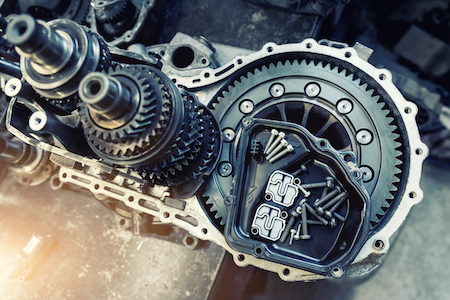You notice the little problems first. A smell. A noise. Your car isn’t driving the way it once did.
Trouble is, you aren’t sure what the problem is. It jerks as you accelerate. It sounds like there’s a problem staying in gear. Could it be that the transmission is failing?
Every car – manual and automatic – has a transmission. It’s how the gears move as you accelerate and break.
How do you know if your transmission is failing?
What is a transmission?
There are two types of car transmissions: manual and automatic. A manual transmission requires the driver to shift gears manually using a clutch pedal and a gear stick. An automatic transmission uses a complex system of hydraulic gears and clutches to automatically shift gears based on the speed and load of the vehicle.
Inside the transmission is a set of gears known as the planetary gearset. This gearset consists of a central sun gear surrounded by planet gears held in place by a ring gear. By engaging different combinations of gears, the transmission can change the speed and torque of the output shaft, providing the necessary power to the drive wheels.
The transmission is an essential part of a vehicle’s drivetrain and plays a crucial role in the performance and efficiency of the car. It allows the engine to operate at its optimal RPM range, providing the necessary power to move the vehicle while conserving fuel. In addition, the transmission also provides the means to reverse the direction of the vehicle and to hold the vehicle stationary, such as when stopped at a traffic light.
How to tell if your transmission is failing
A car’s transmission is a crucial component for transferring power from the engine to the drive wheels. When a transmission begins to fail, it can cause a variety of problems that can affect the performance and safety of the vehicle.
Common problems that can occur when a car’s transmission is failing include:
- Difficulty shifting gears: One of the most common symptoms of a failing transmission is difficulty shifting gears. This can show up in a variety of ways, such as the transmission slipping out of gear or being slow to engage. In severe cases, the driver may be unable to shift gears at all, which can make it difficult or impossible to drive the vehicle.
- Fluid leaks: Another common problem with failing transmissions is fluid leaks. Transmission fluid is essential for lubricating and cooling the various components within the transmission, and a lack of fluid can cause severe damage. If you notice a puddle of reddish fluid underneath your vehicle, you’ll likely have a transmission fluid leak.
- Grinding or shaking: When a transmission begins to fail, it can cause the vehicle to shake or vibrate excessively. This is often accompanied by a grinding or whining noise, which can be caused by the gears within the transmission not meshing properly.
- Burning smells: Another common symptom of a failing transmission is a burning smell. This can be caused by a variety of factors, such as overheated transmission fluid or damaged internal components. If you notice a burning smell coming from your vehicle, it is crucial to have it checked out by a mechanic as soon as possible.
- Loss of power: When a transmission begins to fail, it can cause a loss of power to the drive wheels. This can make it difficult to accelerate or climb hills, and can even cause the vehicle to stall or lose speed while driving.
If you are experiencing any of these problems with your vehicle, it is important to have it checked out by a qualified mechanic as soon as possible. A failing transmission can cause serious damage to other components of your vehicle, and can even be dangerous to drive. By addressing the problem early on, you can avoid costly repairs and keep your vehicle running smoothly.
Things you can do to prevent transmission problems
Like other parts and systems on your car, the transmission rarely fails without warning signs. Use these to guide you as your car ages.
Transmission fluid should be at the correct level and in good condition. This fluid lubricates the transmission and helps to keep it running smoothly. To check the transmission fluid, you will need to locate the dipstick and remove it. Wipe it clean and then reinsert it into the transmission. Pull it out again and check the level of the fluid. It should be between the minimum and maximum marks on the dipstick. If the fluid is low, you can add more using a funnel. Of course, relying on an experienced mechanic to do it for you will allow them to thoroughly inspect the transmission and ensure everything is in optimal condition.
Another thing you can do is to have your transmission serviced regularly. This will typically involve flushing the transmission and replacing the transmission filter. This helps to remove any debris or contaminants that may have built up over time, which can cause problems with the transmission.
In addition, it’s essential to pay attention to how your car is driving. If you notice any strange noises or changes in the way your car shifts gears, this could be a sign that there is a problem with the transmission. In this case, bring your vehicle in and have it checked out by a mechanic as soon as possible.
Finally, it’s important to avoid overloading your car and to drive gently. Avoid aggressive driving, such as rapid acceleration and sudden braking, as this can strain the transmission unnecessarily.
Following these simple steps can help prevent transmission problems and keep your car running smoothly for years to come.

